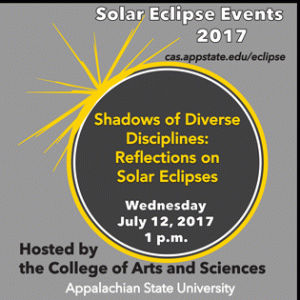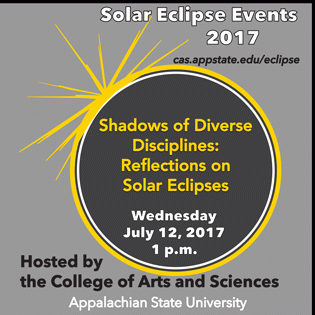As anticipation builds with the solar eclipse approaching this August, the College of Arts and Sciences at Appalachian State University will hold a panel discussion to examine the many interpretations of these events in history, from scientific to religious, and discuss the significance of an eclipse through the variety of disciplines that comprise our College.
“Shadows of Diverse Disciplines: Reflections on Solar Eclipses” an interdisciplinary panel discussion will take place on Wednesday, July 12, 2017 at 1 p.m. in the Belk Library and Information Commons in room 114.
The panel will include Dr. Craig Caldwell, History, Dr. Laura Ammon, Philosophy and Religion, Dr. Courtney McGahee, Physics and Astronomy and will be moderated by Dr. Clark Maddux, Director of Watauga Residential College.
Caldwell will provide a perspective on how Greeks and Romans would have perceived the events of an eclipse. He has just completed an article analyzing Christian responses to the eclipse of A.D. 418 and will discuss the supernatural world that the ancient astronomers sought to understand. He is a historian of the ancient Mediterranean world and of the intersection of the Roman Empire and Christianity.
Ammon will speak to the persistent threads of religion within her observation of the cosmos. She is trained in comparative religion, and studies the intricacies of culture and religion as it relates to gender, power and imagination. Her panel presentation will address different ways celestial events were interpreted through a religious lens by Jews, Christians and Muslims.
McGahee is an astrophysicist and her knowledge of astronomy will highlight the transformations and continuities of the discipline. Her current research projects include identifying new, extremely rare, chemically peculiar stars and investigating mass transfer between the individual stars in binary star systems via chemical markers. She is also currently working to implement a new spectrograph at Dark Sky Observatory to further Appalachian’s capabilities to do chemical abundance analysis studies of stellar atmospheres.
Maddux, who will moderate the discussion, studies Cotton Mather and the American Puritans. Mather had a lifelong interest in natural philosophy and his many letters to the Royal Society, including remarks upon astronomy and eclipses, would earn him a fellowship in the Royal Society, the first to be awarded to a person from the English colonies. Maddux is the editor of one volume of Mather's commentary on the Bible, “Biblia Americana.”
The goal of this panel, leading up to the actual solar event, will be to discuss how the different disciplines view and interpret eclipses through distinctions and commonalities. This event is free and open to the campus and community. For more about upcoming solar eclipse events on and off campus, visit www.cas.appstate.edu/eclipse.
###
About the Solar Eclipse
On August 21, 2017, a solar eclipse will occur over the United States. A total solar eclipse happens when the moon completely covers the sun in the sky, blocking its light and allowing the sun’s outer atmosphere to become viewable. Stars and planets can be visible on a clear day, appearing just like the night sky. Outside the path of a total eclipse, sky watchers around the continental United States will still see a partial eclipse, in which the moon appears to cover a portion of the sun, but the sky will not darken completely.
The path of the total eclipse will be 70 miles wide and will stretch from Oregon to South Carolina. The timing of the total solar eclipse and its duration will depend on where the viewer is located in the path of totality. At most, the moon will completely cover the disk of the sun for two minutes and 40 seconds, but the entire event may take up to four hours.
Anyone planning to view the eclipse should wear solar viewing glasses. This protective eyewear makes it possible for viewers to look directly at the sun before and after the totality. Regular sunglasses cannot be used! Looking directly at the sun, even when it is partially covered by the moon can cause serious eye damage. The only time it is safe to take the protective eyewear off, is during the few minutes of totality, when the sun is completely covered by the moon.
About the College of Arts and Sciences
The College of Arts and Sciences is home to 16 academic departments, two stand-alone academic programs, two centers and one residential college. These units span the humanities, social sciences, and the mathematical and natural sciences. The College of Arts and Sciences aims to develop a distinctive identity built upon our university's strengths, traditions and unique location. Our values lie not only in service to the university and local community, but through inspiring, training, educating and sustaining the development of our students as global citizens. There are approximately 5,850 student majors in the college. As the college is also largely responsible for implementing Appalachian's general education curriculum, it is heavily involved in the education of all students at the university, including those pursuing majors in other colleges. Learn more at cas.appstate.edu
About Appalachian State University
Appalachian State University, in North Carolina’s Blue Ridge Mountains, prepares students to lead purposeful lives as global citizens who understand and engage their responsibilities in creating a sustainable future for all. The transformational Appalachian experience promotes a spirit of inclusion that brings people together in inspiring ways to acquire and create knowledge, to grow holistically, to act with passion and determination, and embrace diversity and difference. As one of 17 campuses in the University of North Carolina system, Appalachian enrolls about 18,000 students, has a low student-to-faculty ratio and offers more than 150 undergraduate and graduate majors.
By: Ellen Gwin Burnette
College of Arts and Sciences
Appalachian State University
Boone, N.C.
June 20, 2017

